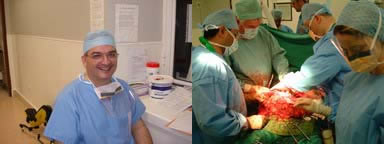Salvage Abdominoperineal resection for anal cancer
Is it reasonable to offer patients who failed radiochemotherapy salvage surgery?
Yes. Failures of CMT are often locoregional (local or in the lymph glands) & not associated with disseminated disease recurrence, at least initially. The published studies (see table below) suggest that one can expect 30-60% of patients treated with salvage surgery (for persistent or recurrent anal cancer following CMT) to survive 5 years.
Publication |
No. of patients |
Median FU (Months) |
Survival |
Tanum, 1993 |
9 |
36 |
67% |
Ellenhorn et al, 1994 |
38 |
47 |
44% 5Y |
Longo et al, 1994 |
14 |
18 |
53% |
Pocard et al, 1998 |
21 |
40 |
58% 3Y |
Van der Wal et al, 2001 |
17 |
53 |
47% 5Y |
Allal et al, 1999 |
23 |
21.5 |
44.5% 5Y |
Akbari et al, 2004 |
57
47 |
24 (overall)
59 (potentially curative) |
33% 5Y
40% 5Y |
Nilsson et al, 2004 |
35 |
33 |
52% 5Y |
Ghouti et al, 2005 |
36 |
67 |
69.4% 5Y |
Renehan et al, 2005 |
73 |
|
40% 5Y |
How difficult are these operations?
Can be difficult
The operation itself can be technically demanding, because of the need for wider perineal clearance, the need to be familiar with inguinal and pelvic lymphadenectomy as well as either familiarity with (or access to) reconstructive techniques such as gracilis & rectus abdominis myocutaneous flaps. Because of the inevitable previous radiotherapy and the large perineal wounds, perineal wounds breakdown in a large proportion of patients, hence the not infrequent need for myocutaneous flaps
The decision making regarding any potential further CMT also need to be made during the surgery. This will influence the use of Vicryl mesh to exclude small bowel from pelvis, marking areas with potential incomplete excision with metal clips. It will also influence the decision of whether to reconstruct the perineal wound primarily or whether to let it granulate and wait until any further CMT is finished.
Salvage lymphadenectomy (especially inguinal)
Again this is a very worthwhile procedure and the literature suggest that 50-60% of patients in this situation will have extended long term survival after lymphadenectomy

